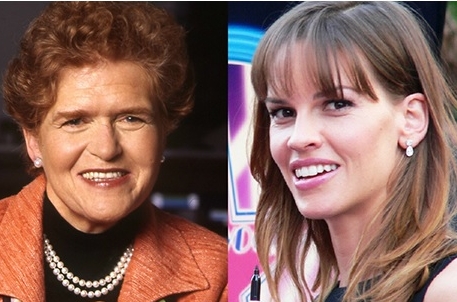Alumna's courtroom drama to be chronicled in 'Denial'
 May 11, 2015
May 11, 2015
By Kerri Farrell
The courtroom drama that captivated the world and exposed a well-known Holocaust denier as a fraud is coming to the big screen -- and Academy Award winner Hilary Swank will play Deborah Lipstadt, MA’72, PhD’76.
Work on “Denial,” which will chronicle Lipstadt’s sensational legal battle for historical truth against David Irving, is due to begin later this year.
“I’m very excited and very pleased,” says Lipstadt, the Dorot Professor of Modern Jewish History and Holocaust Studies at Emory University. “How many people get to see someone else play them, and to have it done by someone of such caliber? It’s going to be intriguing to see her playing me up on the big screen.”
In 1996, Irving sued Lipstadt for libel after she exposed his anti-Semitism and falsification of historical evidence in her book “Denying the Holocaust: The Growing Assault on Truth and Memory.” Since the burden of proof is on the accused under the English legal system, Lipstadt and her legal team were required to prove that the Holocaust actually happened and Irving had manipulated data to make history vanish. She chronicled her exoneration in “History on Trial: My Day in Court with a Holocaust Denier,” a book released in 2005.
A-list talent has been enlisted to tell the story, including two-time Academy Award nominee Tom Wilkinson, who will play Irving, and Emmy award-winning director Mick Jackson (“The Bodyguard,” HBO’s “Temple Grandin”). Screenwriter David Hare’s credits include Oscar-winning films “The Hours” and “The Reader,” as well as his play “Skylight,” currently on Broadway with Bill Nighy and Carey Mulligan.
“They don’t come better than David Hare,” Lipstadt says. “He is one of the world’s top screen writers and playwrights, and he’s very versatile.”
While Lipstadt trusts the professionals to portray the story faithfully, she has served as a consultant throughout the creative process. “I have to give real credit to the producers, the director and the writers,” she says. “They have been absolutely anxious to hear my opinions and listen to what I’ve had to say. But when I’m on set, I’ll keep my mouth shut -- you can’t make a film with the author hovering about!”
Lipstadt believes the subject of the film is as relevant as ever. “Holocaust denial is still an issue,” she says. “I think the movie has the potential to expose the utter intellectual and moral bankruptcy of Holocaust denial as well as its complete antithetical nature to truth to a wider audience.”
Even though “Denial” has been in the works for some time, Deborah still has moments of disbelief. She admits with a laugh, “I have to say, when I was in graduate school at Brandeis, I never thought I’d be having this conversation.”






